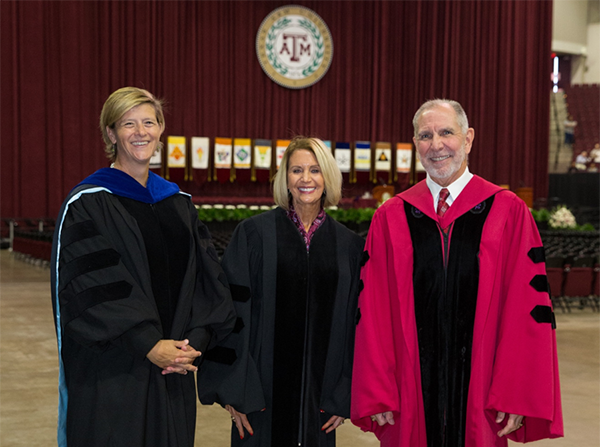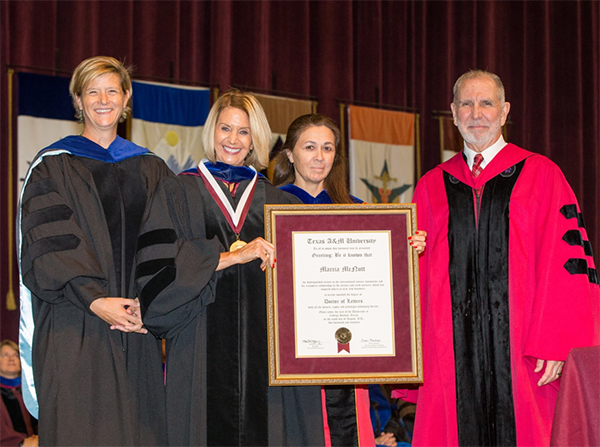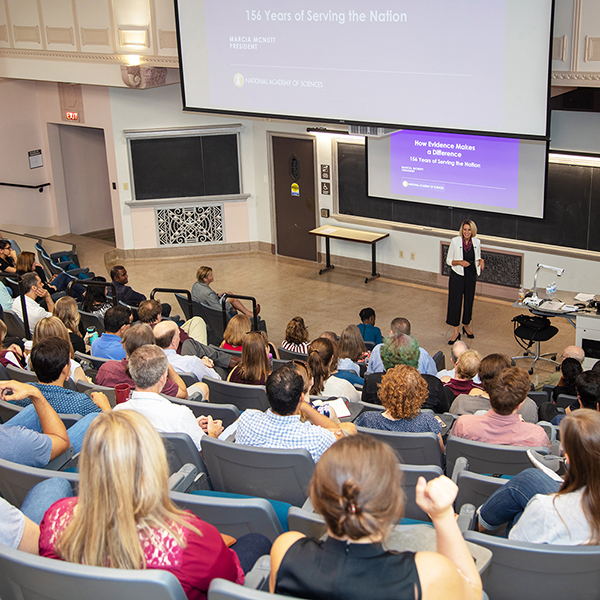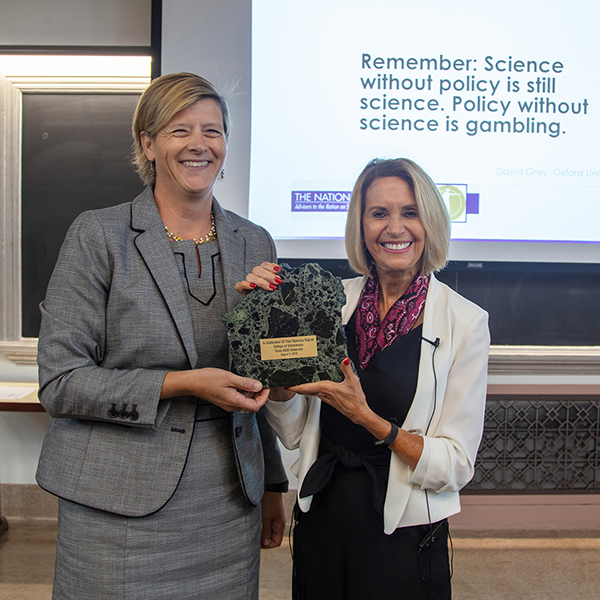National Academy of Sciences President Marcia McNutt Receives Honorary Degree From Texas A&M
The College of Geosciences hosted McNutt’s visit and Aug. 9 public presentation.
Sep 3, 2019


At Texas A&M’s Aug. 9 commencement ceremony: Dean of the College of Geosciences Dr. Debbie Thomas, NAS President Dr. Marcia McNutt, Dean of Faculties and Associate Provost Dr. Blanca Lupiani, and University President Michael K. Young. (Photo courtesy of Texas A&M.)
National Academy of Sciences President Dr. Marcia McNutt received an honorary doctor of letters degree at the Texas A&M University Aug. 9 commencement ceremony, for her extraordinary contributions and leadership in the sciences.
McNutt received the doctorate during the second of two ceremonies that day in College Station, with Texas A&M awarding nearly 2,200 degrees collectively from College Station, Galveston, Doha, Qatar and academic programs at sites across Texas.
“This was an initiative, and ultimately this event was literally three years in the making,” said Dean of the Texas A&M College of Geosciences Dr. Debbie Thomas. “Three years ago, I penned a nomination for someone who at the time, I believed had done more for the advancement of science than practically anyone, anywhere. And she’s only achieved more since!”
“Dr. McNutt is one of the most brilliant scientists and one of the most gifted ambassadors for all of science that this nation has ever known — period,” Thomas added. “But through her accomplishments that have advanced global understandings of critical geophysical processes and through her path into and through critical leadership roles, Dr. McNutt has advanced the cause of equity and diversity in science and has empowered a generation to pursue careers not just in geosciences but in all the sciences.”
McNutt was elected president of the National Academy of Sciences (NAS) — the United States government’s top science advisory organization — in 2016, becoming the first woman to hold the position. At NAS, she has focused on improving ethics in science and promoting women in the field.
After a breakfast with students Aug. 9, the College of Geosciences hosted McNutt’s public presentation, “How Evidence Makes a Difference: One Hundred and Fifty-Six Years of Serving the Nation.”
“I have had opportunities to visit Texas A&M over the years through my involvement with the Ocean Drilling Program,” McNutt said during the presentation. “However, this visit, to receive an honorary award and participate in commencement, gave me the first true insight into the unique and caring culture that binds alums to this institution for the rest of their lives. I could not be prouder to be an honorary Aggie!”


Her record of seminal research contributions to marine geophysics, and in particular, our understanding of continental and oceanic isostasy (the process by which loading on the crust is compensated by the buoyancy of the denser mantle) has had profound implications on our understanding of how the follow of the mantle under different crustal loads affects global changes in sea level and the development of basins at the surface of the earth.
Equally inspiring is her record of accomplishment through scientific leadership: she is a Fellow of the American Association for the Advancement of Science (1998), the American Geophysical Union (AGU) (1988), the Geological Society of America (1998), and the International Association of Geodesy.
Becoming A Renowned Leader In Science
McNutt’s academic preparation and early career trajectory laid the foundation for a transformative body of scholarship and transformative leadership within the sciences. She earned her B.A. in physics from Colorado College in 1973, followed by her Ph.D. in Earth Sciences from Scripps Institution of Oceanography in 1978. After completing her dissertation work, she joined the faculty as a visiting assistant professor at the University of Minnesota 1978-1979. She then became a geophysicist at the United States Geological Survey (USGS) office of earthquake studies 1979-1982. From USGS, she joined the faculty at the Massachusetts Institute of Technology (MIT) in the Department of Earth, Atmospheric and Planetary Sciences as an assistant professor 1982-1986, followed by associate professor 1986-1989, and then professor 1989-1998 and holder of the Griswold Professor of Geophysics.
After serving at MIT, McNutt became the President/CEO of the Monterrey Bay Aquarium Research Institute (MBARI) from 1997 to 2009. During her tenure at the helm of MBARI, McNutt expanded the institute’s ability to address the societally compelling high-risk/high-reward and highly interdisciplinary research challenges that traditionally have been difficult to fund through federal agencies. Dr. McNutt also promoted the mission of MBARI as an innovator of technology that could be transferred to the broader oceanographic community.
In 2009, President Obama appointed McNutt as the director of USGS, where she served from 2009 to 2013.
Her eventful term at the USGS spanned the challenges of the 2010 Deepwater Horizon tragedy, major earthquakes in Haiti and Chile, the California water crisis and the volcanic eruption in Iceland that crippled international air travel.
In 2013, McNutt assumed the position of editor in chief of the prestigious journal Science and in 2016, she moved into her current appointment as the president of the National Academy of Sciences.
A Distinguished Career
In addition to her long list of major society fellowships, McNutt also has earned many of the highest honors in geosciences.
In 1988 she was awarded the Macelwane Medal by AGU for seminal contributions by an early career scholar. And in 2007, she was awarded the Ewing Medal for “significant original contributions to the scientific understanding of the processes in the ocean; for the advancement of oceanographic engineering technology, and instrumentation; or outstanding service to marine science.”
McNutt holds honorary degrees from the Colorado School of Mines (2011), Monmouth University (2010), the University of Minnesota (2004), and Colorado College (1988).
Watch her full presentation here:
By Robyn Blackmon

